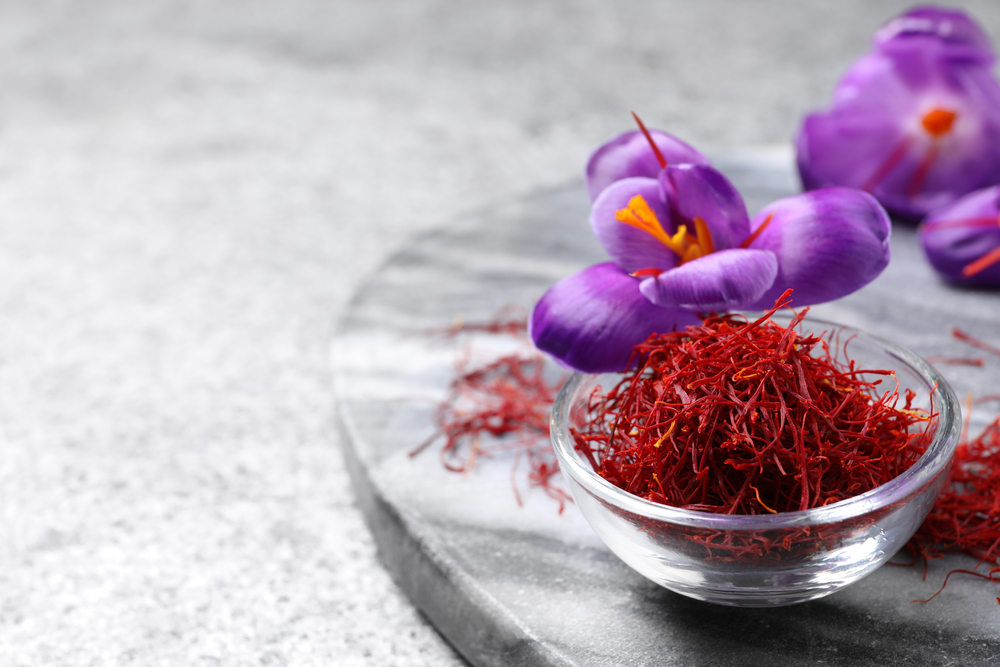Saffron, known as the “golden spice,” is a key ingredient in Mediterranean and Indian cuisines. Its distinct taste and bright colour can elevate any dish, making it a favourite among food lovers.
In this article, we’ll share 10 amazing saffron recipes that will take your cooking to the next level. From savoury meals like paella and biryani to sweet delights such as saffron milk cake, you’ll discover the versatility of this luxurious spice. Whether you’re an experienced chef or just starting out, these recipes will encourage you to explore new culinary traditions and flavours.
Understanding Saffron
Saffron is the dried stigma of the Crocus sativus flower, known for its bright colour and unique smell. The quality of saffron is determined by several factors:
- Aroma: A sweet, floral, and earthy scent.
- Colour: A deep crimson hue, indicating high-quality saffron.
- Flavor: A complex profile that is both sweet and slightly bitter.
The ISO grading system classifies saffron based on moisture content, foreign matter, and floral waste content. Grades range from Negin (Grade 1) to Style (Grade 5), with higher grades reflecting purer saffron.
Traditional vs Modern Cultivation Methods
Traditional saffron cultivation involves handpicking flowers before they open, drying at room temperature, and storing in metal containers or cotton bags. On the other hand, modern methods use machinery for stigma separation and large dehydrators to streamline production.
Iranian Saffron’s Global Dominance
Iranian saffron leads the global market due to its superior crocine levels and robust aroma. This makes it a preferred choice in various dishes such as basmati saffron rice and saffron cream recipes.
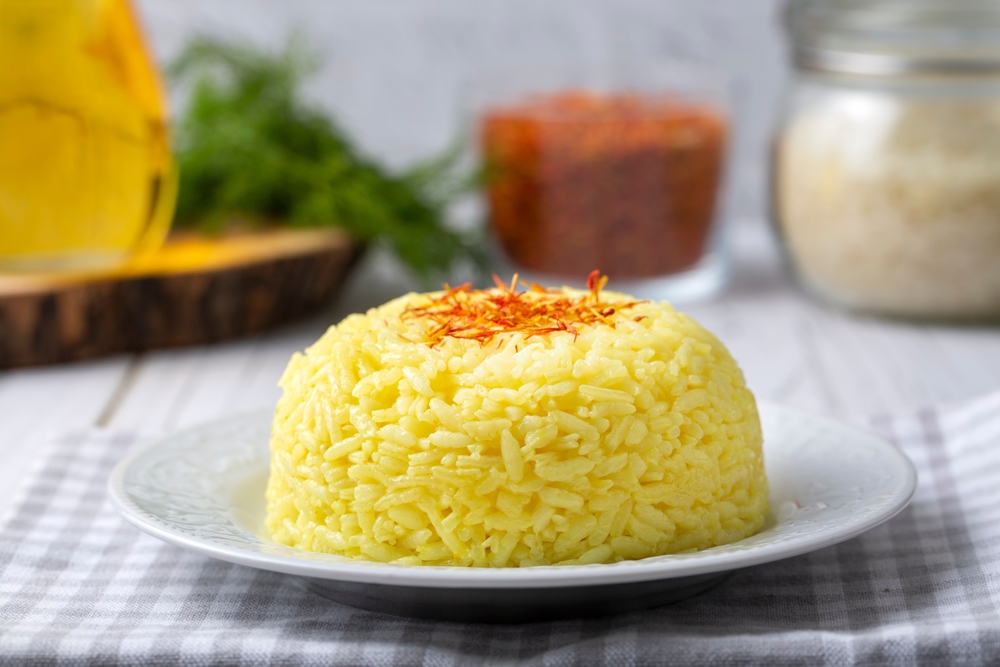
1. Saffron Rice
Creating the best recipe for saffron rice involves a few key ingredients and techniques that bring out its unique flavours:
Ingredients:
- 1 cup of Basmati rice
- 2 cups of water
- A pinch of high-quality saffron threads
- 2 tablespoons of warm milk
- Salt to taste
- Optional: a tablespoon of butter or ghee for extra richness
Preparation Method:
- Rinse the basmati rice thoroughly until the water runs clear.
- Soak saffron threads in warm milk to release their vibrant colour and aroma.
- In a pot, bring water to a boil, add salt, and then stir in the rinsed rice.
- Once the water resumes boiling, reduce heat to simmer, cover with a lid.
- After 10 minutes, gently stir in the saffron-infused milk (and optional butter/ghee), cover again.
- Continue cooking until rice is tender.
The importance of using high-quality saffron cannot be overstated; it provides the deep crimson hue and sweet-earthy flavour. Achieving perfect colour and flavour involves allowing the saffron to steep properly and using fresh basmati rice to absorb these aromatic notes effectively.
2. Saffron Risotto
Risotto alla Milanese, a creamy Italian dish, stands out in the world of saffron recipes for its rich flavours and luxurious texture. Originating from Milan, this dish combines the delicate aroma of saffron with Arborio rice, resulting in a golden-hued delight.
Step-by-Step Cooking Instructions:
Ingredients: Gather Arborio rice, high-quality saffron threads, onion, white wine, chicken or vegetable broth, Parmesan cheese, and butter.
Preparation:
- Sauté onions in butter until translucent.
- Add rice and toast for a few minutes.
- Pour in white wine and let it evaporate.
Cooking:
- Gradually add warm broth, stirring continuously.
- Infuse saffron by soaking threads in a little hot broth before adding to the rice.
Finishing Touches:
- Stir in grated Parmesan and butter for creaminess.
Pairing Suggestions:
For an exquisite dining experience, pair your saffron risotto with a glass of dry white wine such as Pinot Grigio or Chardonnay. Consider serving alongside grilled asparagus or seared scallops for a complete meal.
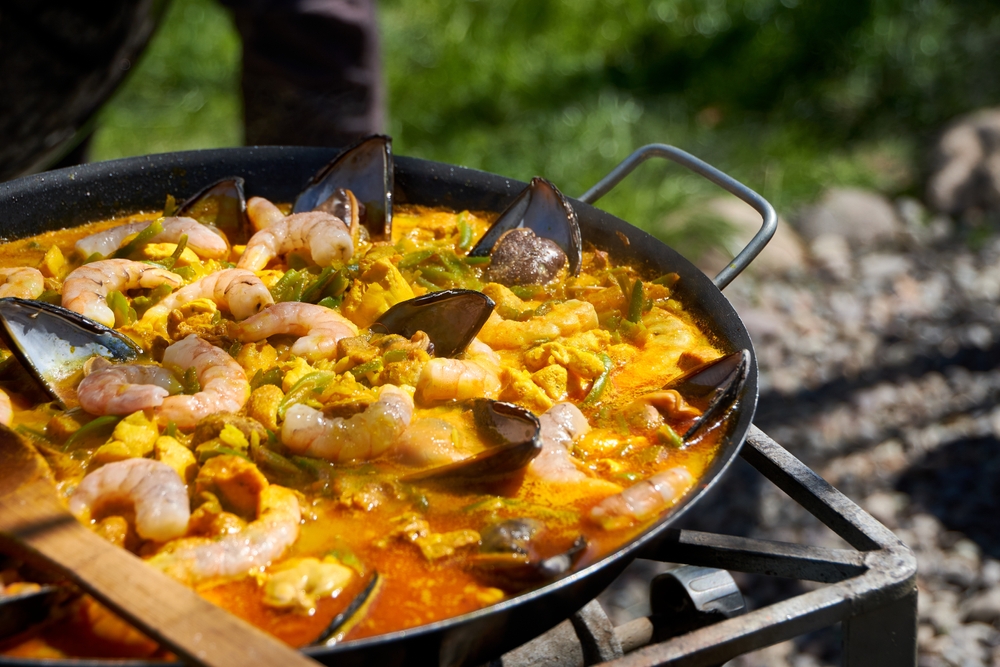
3. Paella with Saffron
Paella, a traditional Spanish dish, is highly regarded in Mediterranean cuisine for its bold flavours and the joy of sharing a meal. It originated in the Valencia region but has become popular worldwide, carrying with it a rich cultural significance. There are many variations of paella, with seafood versions being particularly loved, featuring prawns, mussels, and squid. Meat enthusiasts may prefer versions made with rabbit or chicken.
Cooking Tips for Authentic Flavour
- Use high-quality saffron to enhance the aroma and colour.
- Cook over an open flame if possible to achieve the characteristic socarrat—a crispy crust at the bottom.
- Incorporate fresh, local ingredients to reflect traditional Mediterranean flavours.
This combination of saffron with other ingredients creates an unforgettable culinary delight that honours both tradition and creativity.
4. Biryani with Saffron
Biryani, a classic dish in Indian cuisine, is known for its strong smell and complex mix of flavours. There are different types of biryani across India, ranging from the spicy Hyderabadi version to the fragrant Kolkata style. One of the most important steps in making an authentic biryani is marinating the ingredients. This usually involves using yoghurt, spices, and sometimes ingredients like lemon juice or vinegar to make the meat tender. Another key technique is layering, where cooked rice and marinated meat are placed on top of each other. This method gives the dish its unique texture. Saffron is a crucial ingredient as it adds a golden colour and a rich aroma, taking the biryani saffron experience to another level.
5. Saffron Cream Sauce
Elevate your culinary skills with a saffron cream sauce that pairs beautifully with seafood or chicken dishes. This versatile sauce brings an exotic touch to your meals, enhancing both taste and presentation.
Recipe for Saffron Cream Sauce
Ingredients:
- 1 cup of heavy cream
- A pinch of high-quality saffron threads
- Salt and pepper to taste
- Optional: Lemon zest for added freshness
Preparation Method:
- Gently warm the cream in a saucepan over low heat.
- Add the saffron threads, allowing them to infuse their rich colour and aroma into the cream.
- Season with salt and pepper, adjusting to taste.
- For a citrusy hint, incorporate lemon zest.
Tips for Perfect Flavour Infusion
- Quality Matters: Use premium saffron to achieve the best flavour profile.
- Infusing Technique: Slightly crush the saffron threads before adding them to release more aroma.
- Timing is Key: Let the saffron steep in warm cream, not boiling, to prevent bitterness.
This sauce not only enriches your dish but also showcases the luxurious spice’s full potential.
6. Barberry Rice with Saffron
Barberries, known for their tart and tangy flavour, offer a unique twist to traditional rice dishes. This barberry rice recipe combines the vibrant colour and aroma of saffron with the distinct taste of barberries, creating a dish that’s as stunning as it is delicious. The cooking method involves gently sautéing the barberries before folding them into rice infused with high-quality saffron threads, adding depth and richness to the flavour profile. A staple in Persian cuisine, this dish is often served at celebrations, symbolising joy and prosperity.
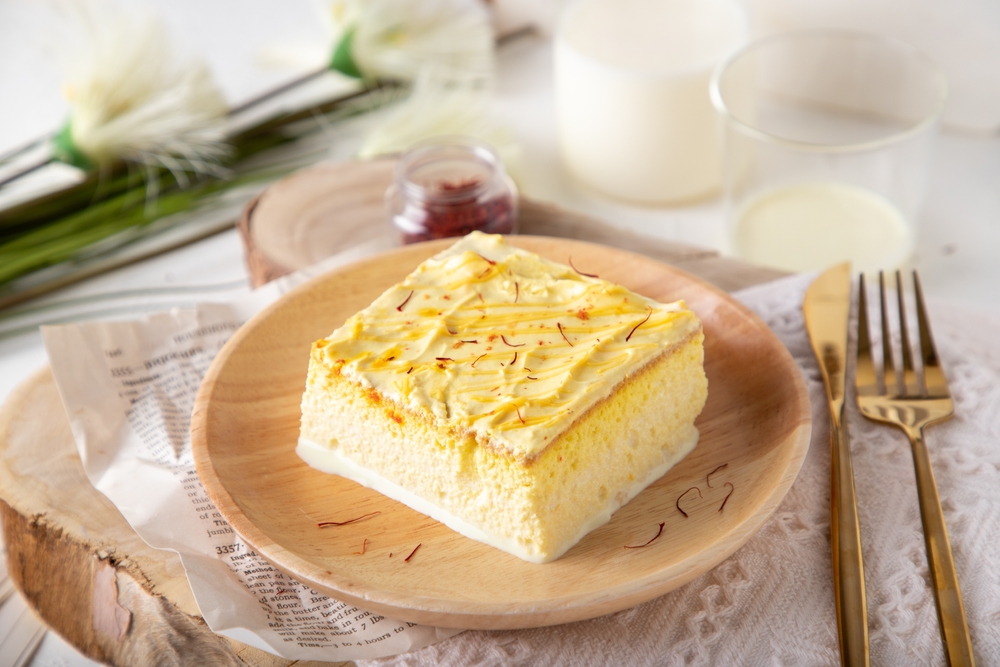
7. Saffron Cake
Saffron cake is a delightful dessert that showcases the spice’s versatility in baking. It offers a unique blend of flavours, providing a subtle floral and earthy undertone that elevates the traditional cake experience.
Saffron Cake Recipe
To create a fluffy and aromatic saffron cake, follow these steps:
Ingredients
- 1 tsp saffron threads
- 2 tbsp warm milk
- 1½ cups all-purpose flour
- 1 cup sugar
- ½ cup unsalted butter, softened
- 3 large eggs
- 1 tsp vanilla extract
- 1 tsp baking powder
- A pinch of salt
Preparation
- Infuse saffron: Soak the saffron threads in warm milk for at least 10 minutes to release their vibrant colour and aroma.
- Preheat your oven to 175°C (350°F) and grease a cake tin.
Mixing
- Cream together butter and sugar until light and fluffy.
- Add eggs one at a time, beating well after each addition.
- Stir in vanilla extract and the saffron-infused milk.
Combining
- In a separate bowl, whisk together flour, baking powder, and salt.
- Gradually fold dry ingredients into the wet mixture until just combined.
Baking
- Pour the batter into the prepared tin and smooth the top.
- Bake for 30-35 minutes or until a skewer inserted into the centre comes out clean.
A saffron cake is best enjoyed with a simple dusting of icing sugar or paired with a dollop of whipped cream for an extra touch of indulgence.
8. Saffron Milk Cake
Saffron Milk Cake, often referred to as Rasmalai or Kesar Peda, is a beloved Indian dessert that showcases the luxurious flavour of saffron. This indulgent treat combines the richness of milk with the unique aroma of saffron, resulting in a dessert that’s both creamy and aromatic.
Ingredients
- Saffron strands: High-quality saffron enhances the flavour and colour.
- Milk: Full-fat milk for a rich texture.
- Sugar: To sweeten the dish.
- Cardamom powder: Adds a warm, spicy note.
- Nuts: Almonds and pistachios, finely chopped for garnish.
Preparation Steps
- Infuse Saffron: Soak saffron strands in warm milk to release its deep hue and aroma.
- Prepare Milk Base: Boil milk with sugar until it thickens slightly, stirring continuously.
- Add Flavours: Stir in cardamom powder and infused saffron milk for an enhanced flavour profile.
- Garnish and Serve: Pour into serving bowls, garnish with nuts, and chill before serving.
By incorporating these ingredients thoughtfully, you can craft a saffron milk cake that delights the senses, offering an authentic taste of Indian culinary tradition.
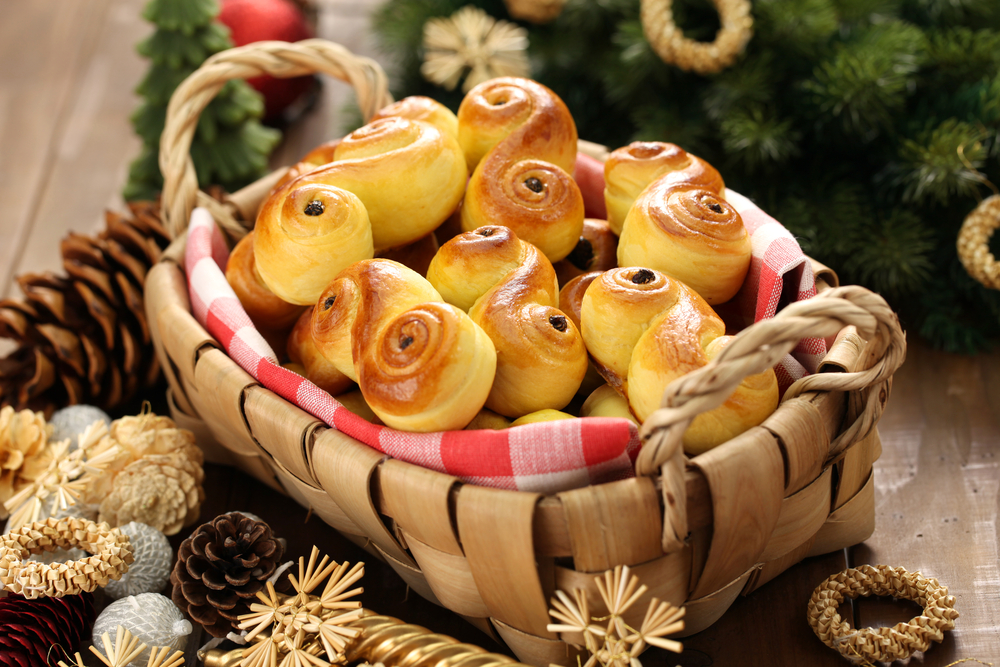
9. Saffron Buns
Making saffron buns involves adding this luxurious spice to the dough, giving it a rich smell and bright colour. The secret to making great saffron buns is in how you prepare the saffron: gently crush the threads and soak them in warm milk to bring out their full flavour.
Tips for Perfect Saffron Buns:
- Texture Enhancement: Allow the dough to rise adequately; this ensures a fluffy texture.
- Flavour Boost: Incorporate a small amount of cardamom or vanilla for added depth.
- Colour Intensity: Use high-quality saffron for a deep golden colour that elevates both appearance and taste.
Trying out different spices can lead to exciting new versions of these delicious buns.
10. Exploring Other Sweet Treats with Saffron
Saffron’s unique flavour elevates many Indian sweets, adding depth and richness to traditional favourites. Here are a few delightful desserts that showcase the magic of saffron:
- Kaju Puri: A delightful dessert made from cashews, sugar, and ghee, where saffron imparts a touch of luxury. This sweet treat is often enjoyed during festivals, reflecting its cultural significance.
- Shahi Pulao: A rice-based dessert imbued with nuts, dried fruits, and saffron. The preparation of this dish involves soaking saffron strands in warm milk to release their full aroma and colour.
These sweet treats transform simple ingredients into opulent delicacies that celebrate heritage and taste.
Conclusion
Discover the benefits of using saffron in recipes and elevate your culinary skills with these exquisite dishes. From the aromatic allure of saffron rice and the creamy indulgence of saffron risotto to the rich layers of biryani, each recipe offers a unique way to experience this luxurious spice.
- Versatility: Saffron’s ability to blend seamlessly into both savoury and sweet dishes makes it a valuable addition to any kitchen.
- Cultural Richness: Enjoy a taste journey through Mediterranean, Indian, Persian, and more cuisines with these diverse recipes.
Unleash your creativity by experimenting with different saffron recipes. Whether you’re preparing a festive meal or simply seeking to add a touch of elegance to everyday cooking, saffron can transform any dish into something extraordinary.
By embracing these recipes at home, you’ll not only enhance your cooking repertoire but also gain a deeper appreciation for one of the world’s most prized spices. Share your creations with family and friends, and relish the joy that saffron brings to every meal.
FAQ’s
1- What is saffron and where does it come from? Saffron is a spice derived from the stigmas of the Crocus sativus flower, primarily cultivated in Iran, which dominates global saffron production.
2- How should I store saffron properly? Store saffron in an airtight container away from direct sunlight in a cool, dry place. When properly stored, it can maintain its flavour and aroma for up to two years.
3- Why is saffron so expensive? Saffron’s high cost is due to its labour-intensive harvesting process, with each flower producing only three stigmas that must be hand-picked, and it takes about 150-170 flowers to produce just one gram of saffron.
4- What’s the best way to use saffron in cooking? For optimal results, steep saffron threads in warm water or milk for 15-30 minutes before adding to your dish to release maximum flavour and colour.
5- How can I tell if saffron is authentic? Genuine saffron has a distinctive sweet aroma, deep red colour, and slightly bitter taste. When placed in warm water, it should slowly release its colour without immediately turning the water yellow.
6- Can saffron be used in both sweet and savoury dishes? Yes, saffron is incredibly versatile and can enhance both sweet treats like cakes and buns, as well as savoury dishes such as rice, risotto, and sauces.
7- How much saffron should I use in my cooking? A little goes a long way – typically, just a few strands (0.1 to 0.3 grams) are sufficient for a dish serving 4-6 people.
8- What are the traditional dishes that commonly use saffron? Traditional dishes include Persian saffron rice, Spanish paella, Indian biryani, Italian risotto, and Swedish saffron buns.
9- Does saffron have any health benefits? Saffron is known for its antioxidant properties and has been traditionally used to improve mood, reduce stress, and aid digestion.
10- What’s the difference between saffron threads and saffron powder? Saffron threads are the whole stigmas and are generally more reliable for authenticity, while powder can be easily adulterated. Threads also provide better flavour control in cooking.
Autumn Recipes: A Hearty Classic With a Chilli Kick
Christmas at Babur Indian restaurant, London
Autumn Recipes: Succulent Spiced Shawarma Chicken with a Saucy Sesame dressing

